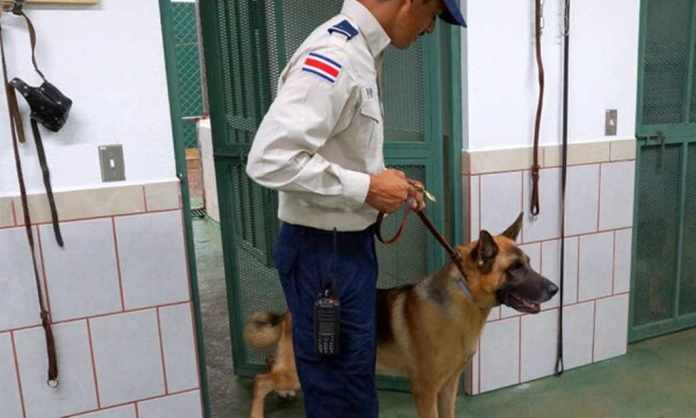“Man’s best friend” is a common phrase about domestic dogs. But not so much for the 2,596 men and women discovered by dogs trying to smuggle illegal drugs into prisons in the first five months of this year.

The discovery was made possible to the credit of the new canine unit created in Perez Zeledon in January of this year, made possible by a donation of dogs and training by the U.S. Embassy, at a cost exceeding ¢115 million colones.
The Ministra de Justicia, Marcia Gonzalez, said in a press release that many people who enter the penitentiary with drugs are “allied with organized gangs, dedicated to the transfer of drugs in the country’s penal centers.”
Gonzalez added that the information will be made available to other police forces to combat the operation of these narco networks.
Ironic is that the construction of the modules where the dogs are housed in Pérez Zeledón was by prisoners from the La Reforma de San Rafael in Alajuela and the Pococí and Puntarenas prisons.
The canine unit counts with 38 dog breeds such as Belgian Shepherd, Malinois, German Shepherd, Labrador, and Schnauzer for the detection of drugs, explosives and tracking of people, the latter for monitoring when there are escapes.
Most detained are women
Between January and May, 1,469 women and 1,127 men were arrested. Of these, 1,865 were visitors, 687 were prisoners, 16 prison police officers and two officials from other areas, among others.
This crime is punishable by 8 to 20 years in prison.
However, the sentence is reduced from three to eight years in prison, when the arrested is a woman in poverty, head of household in vulnerable condition or has minors under her charge.
Also if it is about female seniors or people with any type of disability that is dependent on others for their care. In those cases, the judge may order house arrest or other alternatives to prison.

Drugs in prison
The Penitentiary Police has confiscated in the last five months varied loads totally 28 kilos of marijuana, cocaine and crack, while the total for all of last year was 43 kilos. If the trend continues, the seizures this year will surpass last year.
In addition to illegal drugs, confiscated were 410 cell phones and 64 identity cards (cedulas) that did not correspond to the person who carried them.


